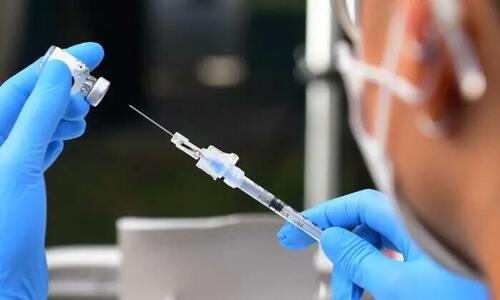
Authored by Zachary Stieber via The Epoch Times (emphasis ours),
Some lots of COVID-19 vaccines caused significantly more adverse events than others, according to newly published information.

Some batches were linked to as many as 1,650 serious problems, while some produced zero reported issues, according to the data, which was obtained by the Informed Consent Action Network and presented on the website OpenVAERS.
The network received the data through Freedom of Information Act requests from the U.S. Centers for Disease Control and Prevention (CDC).
“Certain lots had an unusually high number of adverse reactions,” the network said in a statement.
The data undercut a 2022 statement from the U.S. Department of Health and Human Services (HHS) to Sen. Ron Johnson (R-Wis.). The department said at the time that an analysis by the U.S. Food and Drug Administration (FDA) showed “no unusual concentration of reports with a single lot or small group of lots.”
The HHS is the parent agency of the CDC and the FDA.
Mr. Johnson told Dr. Mandy Cohen, the CDC’s director, and Dr. Robert Califf, the FDA’s commissioner, in a new letter that the newly disclosed data “paint a very concerning picture.”
“As a former manufacturer, this data provides strong evidence that the vaccine manufacturing process was not in control,” Mr. Johnson wrote. If the data are accurate, “then your agencies have kept this vital information hidden from Congress and the American people for years, despite my requests for this data beginning in December 2021,” he added.
Spokespersons for the CDC and FDA said the agencies received the letter. The spokespersons said the agencies would respond at a later time to Mr. Johnson.
The HHS did not respond to a request for comment.
According to independent research reviewed by Mr. Johnson in 2021, as many as 5,297 adverse event reports were linked to certain vaccine batches, while other lots had as few as one reported adverse event.
The reports were made to the Vaccine Adverse Event Reporting System (VAERS), which is co-run by the FDA and CDC. The system accepts reports from anybody but studies have shown most reporters are health care workers. Reporters face penalties if they enter information later found to be false, and many reports have been verified by health authorities.
Melanie Anne Egorin, the assistant HHS secretary for legislation, made the 2022 statement to Mr. Johnson before adding that the number of reported events may vary by lot due to “important factors such as the lot size and the length of time a lot has been in use.”
She said that COVID-19 vaccine lots are backed by certificates from manufacturers and that the FDA has visited sites to ensure quality, safety, and effectiveness.
More on New Data
The Informed Consent Action Network submitted multiple FOIA requests for lot information, and eventually sued when the data was not released.
Updated datasets were provided on Dec. 13, 2023, the network said.
The nonprofit shared the data with OpenVAERS, which describes itself as a project “developed by a small team of people with vaccine injuries or who have children with vaccine injuries.”
Before receiving the data, “it was impossible to determine the Serious Adverse Event (SAE) rate by lot number because we did not know the total number of doses in the lot,” OpenVAERS said on its site. With the new data, “we can now confirm that some batches of Covid-19 vaccines are significantly more dangerous than others.”
The project linked the lot information with VAERS reports that included batch data to produce the total number of reported serious adverse events, and rates of serious adverse events, per batch.
Serious adverse events were defined by the definition used by VAERS, which is an event that leads to an emergency room visit, a hospitalization, permanent disability, or death, or is life-threatening or results in a birth defect.
Many lots had between 10 and 500 reported serious adverse events linked to them, according to OpenVAERS. Twenty-two had between zero and nine reported adverse events. Forty-five had 501 or more adverse events.
Reported deaths following vaccination were also higher for certain lots, particularly for some Moderna batches.
The data cover the Pfizer-BioNTech and Moderna vaccines.
Pfizer and Moderna did not respond to requests for comment.
Some lots were flagged by Pfizer for deviation from quality standards, according to FDA documents recently produced under court order, but still released to the public.
Mr. Johnson urged the FDA and CDC to provide responses to questions by Jan. 26. He asked for the analysis the FDA allegedly performed to look into whether certain lots were associated with unusual concentrations of reported adverse events, whether the agency took any issue with the OpenVAERS' analyses, and what steps the agency would take if it did determine any COVID-19 vaccine lots were associated with higher rates of adverse events.
HHS says in a guide that VAERS “is used to continually monitor reports to determine whether any vaccine or vaccine lot has a higher than expected rate of events.”
Danish researchers reported in 2023 that they examined rates of serious adverse events across batches of the Pfizer-BioNTech vaccine and found that certain batches were linked to many more events than others. They noted that leaked data showed there was a “significant difference” between the amount of modified messenger RNA between batches of the Pfizer vaccine.
Authored by Zachary Stieber via The Epoch Times (emphasis ours),
Some lots of COVID-19 vaccines caused significantly more adverse events than others, according to newly published information.

Some batches were linked to as many as 1,650 serious problems, while some produced zero reported issues, according to the data, which was obtained by the Informed Consent Action Network and presented on the website OpenVAERS.
The network received the data through Freedom of Information Act requests from the U.S. Centers for Disease Control and Prevention (CDC).
“Certain lots had an unusually high number of adverse reactions,” the network said in a statement.
The data undercut a 2022 statement from the U.S. Department of Health and Human Services (HHS) to Sen. Ron Johnson (R-Wis.). The department said at the time that an analysis by the U.S. Food and Drug Administration (FDA) showed “no unusual concentration of reports with a single lot or small group of lots.”
The HHS is the parent agency of the CDC and the FDA.
Mr. Johnson told Dr. Mandy Cohen, the CDC’s director, and Dr. Robert Califf, the FDA’s commissioner, in a new letter that the newly disclosed data “paint a very concerning picture.”
“As a former manufacturer, this data provides strong evidence that the vaccine manufacturing process was not in control,” Mr. Johnson wrote. If the data are accurate, “then your agencies have kept this vital information hidden from Congress and the American people for years, despite my requests for this data beginning in December 2021,” he added.
Spokespersons for the CDC and FDA said the agencies received the letter. The spokespersons said the agencies would respond at a later time to Mr. Johnson.
The HHS did not respond to a request for comment.
According to independent research reviewed by Mr. Johnson in 2021, as many as 5,297 adverse event reports were linked to certain vaccine batches, while other lots had as few as one reported adverse event.
The reports were made to the Vaccine Adverse Event Reporting System (VAERS), which is co-run by the FDA and CDC. The system accepts reports from anybody but studies have shown most reporters are health care workers. Reporters face penalties if they enter information later found to be false, and many reports have been verified by health authorities.
Melanie Anne Egorin, the assistant HHS secretary for legislation, made the 2022 statement to Mr. Johnson before adding that the number of reported events may vary by lot due to “important factors such as the lot size and the length of time a lot has been in use.”
She said that COVID-19 vaccine lots are backed by certificates from manufacturers and that the FDA has visited sites to ensure quality, safety, and effectiveness.
More on New Data
The Informed Consent Action Network submitted multiple FOIA requests for lot information, and eventually sued when the data was not released.
Updated datasets were provided on Dec. 13, 2023, the network said.
The nonprofit shared the data with OpenVAERS, which describes itself as a project “developed by a small team of people with vaccine injuries or who have children with vaccine injuries.”
Before receiving the data, “it was impossible to determine the Serious Adverse Event (SAE) rate by lot number because we did not know the total number of doses in the lot,” OpenVAERS said on its site. With the new data, “we can now confirm that some batches of Covid-19 vaccines are significantly more dangerous than others.”
The project linked the lot information with VAERS reports that included batch data to produce the total number of reported serious adverse events, and rates of serious adverse events, per batch.
Serious adverse events were defined by the definition used by VAERS, which is an event that leads to an emergency room visit, a hospitalization, permanent disability, or death, or is life-threatening or results in a birth defect.
Many lots had between 10 and 500 reported serious adverse events linked to them, according to OpenVAERS. Twenty-two had between zero and nine reported adverse events. Forty-five had 501 or more adverse events.
Reported deaths following vaccination were also higher for certain lots, particularly for some Moderna batches.
The data cover the Pfizer-BioNTech and Moderna vaccines.
Pfizer and Moderna did not respond to requests for comment.
Some lots were flagged by Pfizer for deviation from quality standards, according to FDA documents recently produced under court order, but still released to the public.
Mr. Johnson urged the FDA and CDC to provide responses to questions by Jan. 26. He asked for the analysis the FDA allegedly performed to look into whether certain lots were associated with unusual concentrations of reported adverse events, whether the agency took any issue with the OpenVAERS’ analyses, and what steps the agency would take if it did determine any COVID-19 vaccine lots were associated with higher rates of adverse events.
HHS says in a guide that VAERS “is used to continually monitor reports to determine whether any vaccine or vaccine lot has a higher than expected rate of events.”
Danish researchers reported in 2023 that they examined rates of serious adverse events across batches of the Pfizer-BioNTech vaccine and found that certain batches were linked to many more events than others. They noted that leaked data showed there was a “significant difference” between the amount of modified messenger RNA between batches of the Pfizer vaccine.
Loading…





